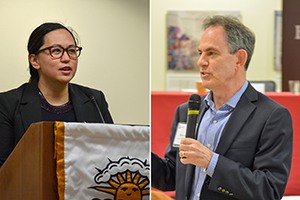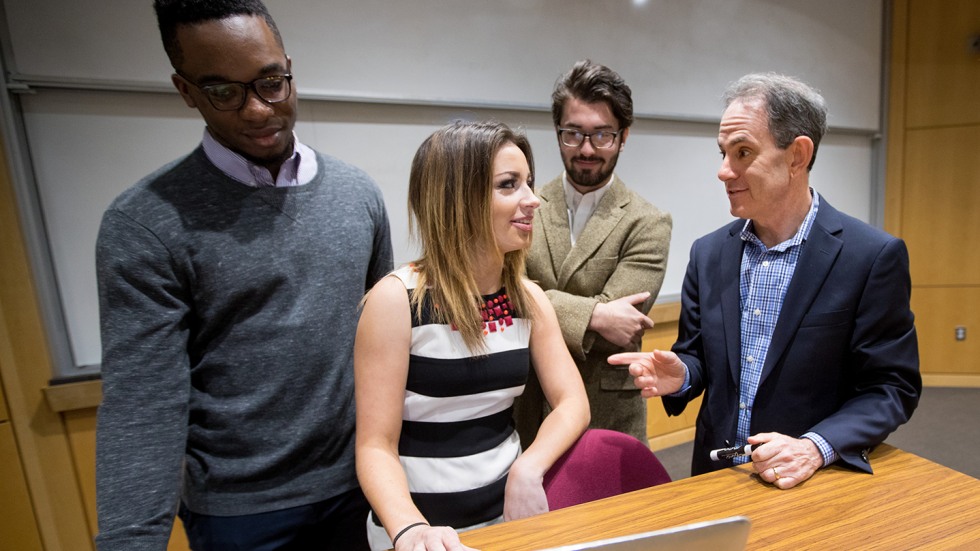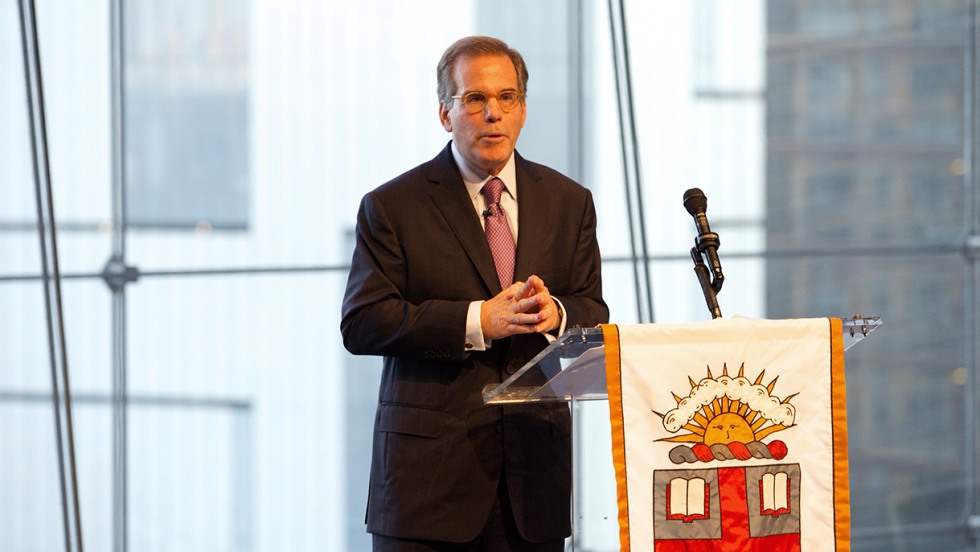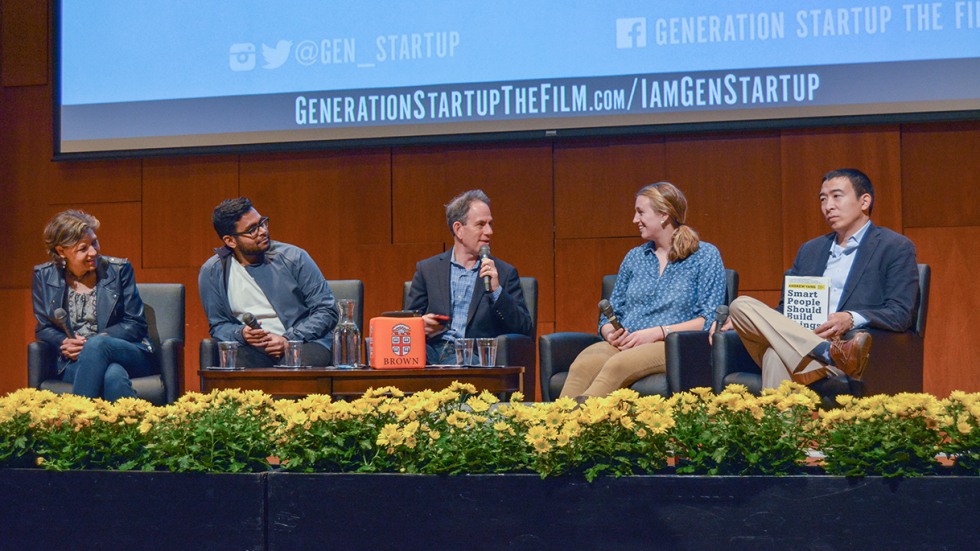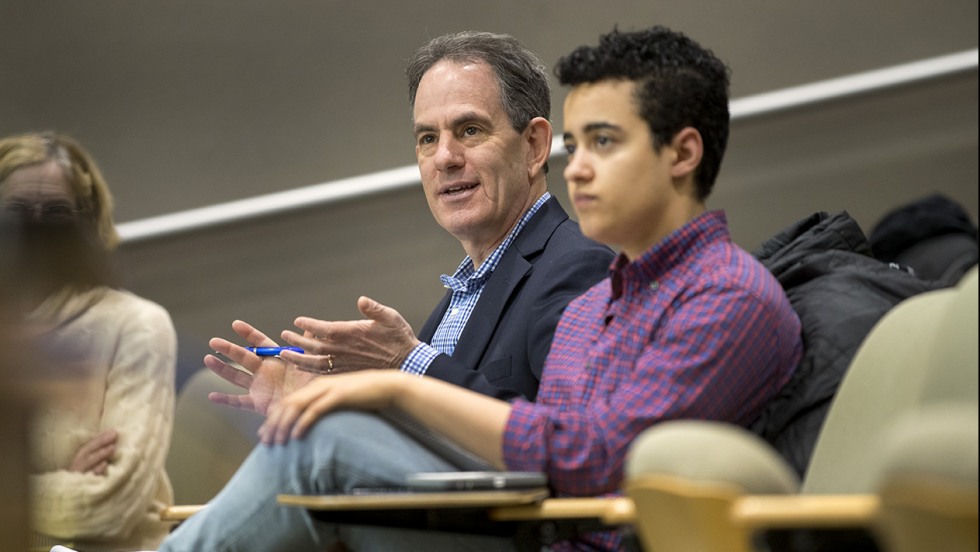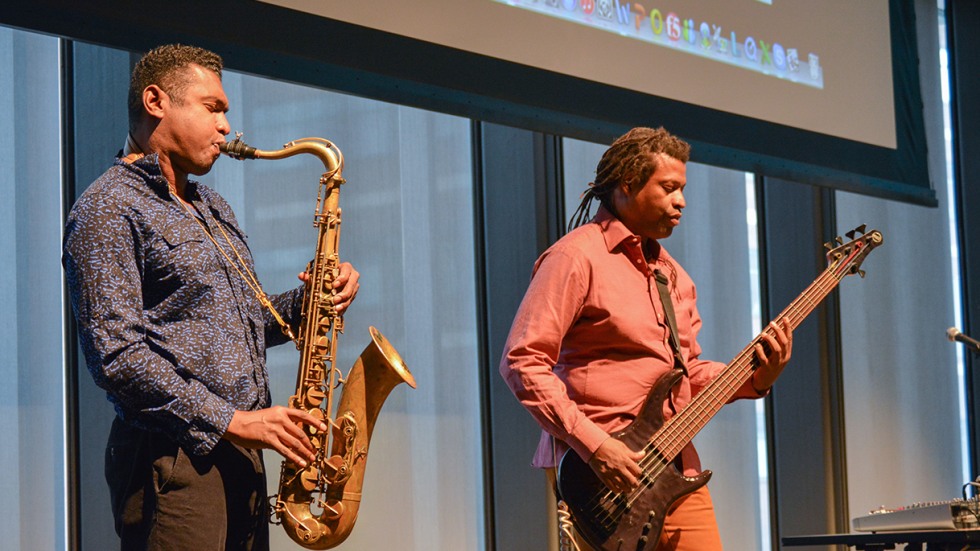PROVIDENCE, R.I. [Brown University] — Ten months after a $25 million gift jump-started plans to launch the Jonathan M. Nelson Center for Entrepreneurship at Brown University, the center’s doors are open, a staff is in place, courses are in progress, and a lineup of partnerships, initiatives and events is underway.
And if the center’s early efforts — in less than one full semester in operation — offer any indication, it will serve as a far-reaching, state-of-the-art nexus for entrepreneurship education and practice that integrates and embeds entrepreneurship across the University’s fields of study, both inside the classroom and beyond.
“Entrepreneurship has been embedded in Brown’s culture for decades,” said Danny Warshay, a 1987 Brown alumnus and the center’s inaugural executive director. “In launching the Jonathan M. Nelson Center, our mission is to make entrepreneurship an essential part of the Brown experience.”
Already, the center has teamed with faculty in the arts to launch an Arts, Technology and Entrepreneurship event series. Staff and students are partnering with the University’s First-Generation College and Low-Income Student Center and the Brown Center for Students of Color to support their work with underrepresented entrepreneurs at Brown and across Rhode Island.
To advise brain scientists, medical school students and public health experts on how entrepreneurship can solve problems, the center led workshops on “bottom-up” research.
As part of an Entrepreneurship Month celebration in November, the center screened a documentary film titled “Generation Startup,” directed by a Brown alumna, and streamed a live post-film Q&A to 14 universities across America. Yesterday, it hosted a major academic conference on entrepreneurship at the intersection of diversity and inequality.
And those are just a few examples.
“The energy around entrepreneurship at Brown is palpable,” Warshay said. “We want to build on that momentum and collaborate across all parts of the University’s ecosystem. Like any successful startup, we have hit the ground sprinting.”
Engage, inspire and empower
The $25 million gift to launch the center came last January from Jonathan M. Nelson, a 1977 Brown undergraduate alumnus and founder and CEO of Providence Equity Partners. To celebrate Nelson’s gift, a group of pre-eminent entrepreneurs from the Brown community and beyond convened in New York in September, shortly after Warshay joined the University as the center’s executive director.
A veteran entrepreneur and educator, Warshay has taught at Brown and at Tel Aviv University for years. Much of the center’s early focus, he said, has been on developing a broad array of opportunities designed to educate and empower aspiring entrepreneurs and to pique the interest of students, faculty and members of the greater Brown community with no prior exposure to entrepreneurship.
“There is a wide spectrum of experience with entrepreneurship across the Brown community,” Warshay said. “Some have no previous exposure, so many resources are geared toward engaging students for the first time in entrepreneurial concepts. After that introduction, we are inspiring them to take action. And other resources — venture support, for example, and alumni mentoring — are designed to empower students to take meaningful steps in their own careers as they transition into life after their years on campus.”
Creating new courses for students across the disciplines to gain a rigorous academic grounding in the fundamentals of entrepreneurship will play an important role in that process.
This semester, three faculty members (Warshay included) are teaching sections of “The Entrepreneurial Process,” which is in the business, entrepreneurship and organizations (BEO) concentration and among the most in-demand courses are Brown. Rafael La Porta — a professor of finance at Dartmouth’s Tuck School of Business who is the first visiting professor hired through the center — is teaching a new course on “Entrepreneurial Finance and Venture Capital.”
With funds from Jonathan Nelson’s gift, searches for full-time faculty whose primary expertise is in entrepreneurship are underway in Brown’s sociology and economics departments. Over time, the center will hire visiting professors, entrepreneurs-in-residence and professors of the practice to complement the efforts of full-time faculty to integrate entrepreneurship into the Brown curriculum.
Mary Fennell — a professor of sociology and of health services, policy and practice who directs the BEO concentration — helped to develop the original proposal for a campus entrepreneurship center at Brown. She said that through a combination of curriculum-based work and outside-the-classroom programming, the new center will help existing programs to encourage students to both master the basics on launching new ideas and new firms and to push past those foundational skills.
“You do that by fully engaging faculty and students, involving disciplines across campus and emphasizing both the ‘doing’ of entrepreneurship as well as the ‘knowing’ of it as something to be researched and analyzed,” Fennell said. “You also do it by helping degree programs like BEO and PRIME (the master’s level program in innovation management and entrepreneurship) to grow beyond foundation courses and into important new courses on venture capital, private vs. nonprofit models of entrepreneurship, the arts and entrepreneurship, and additional topics we will be able to offer to students with resources for new faculty and the development of new courses.”
She said that in serving as the connective tissue across campus and beyond, the Nelson Center for Entrepreneurship will have a significant impact on creating an identity for entrepreneurship that is recognizable, exciting and builds on the Brown’s strengths in pushing past the traditional boundaries that divide disparate fields of study.
“What is unique about entrepreneurship at Brown is that it has grown and proliferated without the usual professional schools as incubators,” Fennell said. “We have no business school and no law school. As with so many great initiatives at Brown, entrepreneurship is defined as interdisciplinary. We have engineers talking to social scientists; other STEM disciplines listening to historians; biomed and public health scholars connecting with artists and design experts; people from Brown, RISD, the University of Rhode Island, the city of Providence and the state of Rhode Island — this is really a heady, exciting mix of ideas and views.”
Jason Harry, an associate professor of the practice of engineering, teaches “The Entrepreneurial Process” and has directed the immersive summer Breakthrough Lab (B-Lab) venture development program. Previously, there were few accessible resources for students who had completed either experience and wanted to continue working on their enterprise. The creation of the new center addresses that gap, he said.
“Entrepreneurship at Brown is no longer a precipitous cliff,” Harry said. “When B-Lab operated outside of the context of the Nelson Center, students would ask: ‘What do I do next?’ Now there’s a framework and a platform in place for students who have successfully completed their early range-finding efforts to continue exercising those entrepreneurial muscles and to advance their ventures.”
An expanded range of courses will offer new opportunities to meet what he sees as significant demand for entrepreneurial skills among Brown’s student body.
“Entrepreneurship is a complex endeavor,” Harry said. “A single, 12-week exposure to that in ‘The Entrepreneurial Process’ is a wonderful opening of that book, but it’s necessarily limited in depth. New courses can allow for deeper treatment of aspects such as market research, customer discovery or financing, for example. Importantly, these are skills and a knowledge base that don’t serve only students who want to launch startups — they are applicable across all areas of professional activity.”
A student-centered approach
The center will also serve as a hub for student entrepreneurial organizations. The student-run Brown Entrepreneurship Program, for example, has created an array of activities on campus to inspire interest and educate those interested in entrepreneurial careers for nearly two decades. Separately, the B-Lab offers immersive summer experiences in entrepreneurship and will be operated through the center.
Among the new initiatives the Nelson Center for Entrepreneurship has launched this fall is a team of five Peer Entrepreneurs-in-Residence (or PEIRS) — students who bring real-world experiences and lessons learned and advise peers looking for practical guidance on ideas, projects and ventures along with how best to jump into the entrepreneurial community at Brown.
Morgan Cheatham, a senior neuroeconomics concentrator and PEIR, recently launched Lasso Investing, a financial technology startup that builds investments through crowdsourcing. Cheatham says the center’s open approach and desire to infiltrate every academic field of study offers a distinctively Brown approach to entrepreneurship that is unparalleled at other institutions.
“The Nelson Center for Entrepreneurship is an open platform and a place for everybody — not just for tech startups or for people launching companies that will only serve college campuses,” Cheatham said. “There are things happening across industries and spaces, from food, to fashion, to finance. The center facilitates cross-pollination between traditional academic departments. There are just so many things that people can explore because we don’t have this rigid incubation program where only certain people get in and only certain people can participate. It’s incredibly accessible.”
Another PEIR, senior history concentrator Daniel Breyer, has worked at a Silicon Valley venture capital firm for three years, sourcing investments and directing web and social media projects. After two months spent advising prospective entrepreneurs on fundraising, venture capital and other startup challenges, he says the new center’s value to students comes in its role as a focal point for all things entrepreneurial at Brown.
“Brown has amazing resources to offer to entrepreneurs, and one of the goals of the center is to make those things more visible,” Breyer said. “Before, people on campus didn’t always know where to start — now we can point them in the right direction. From there, if they are willing enough, committed enough and have enough momentum, they can push for success themselves with the center as a foundational point.”
The path forward
For the 2016-17 academic year, the center is operating out of a third-floor suite at Brown-RISD Hillel. Planning for a permanent facility — with classrooms, offices for PEIRs and staff and dedicated workspace for students and faculty to collaborate on developing new ventures — is underway.
Reporting to Brown Provost Richard M. Locke, Warshay leads a staff that this fall added Jonas Clark, an entrepreneur and former resident dean at Harvard, and Liz Malone, a program manager who has managed existing entrepreneurial initiatives at Brown, including B-Lab.
Though the Nelson Center for Entrepreneurship is still in its infancy, Warshay said it is well on its way toward
not only launching ventures and inspiring careers, but amplifying Brown’s ability to bring together expertise and perspectives to advance knowledge, solve big problems and serve the greater good.
“Entrepreneurship is not simply a narrow set of skills to apply in the business world,” he said. “It’s a set of tools and approaches that can develop solutions to challenges in anything from health care and medicine to environmental issues, public policy, technology and more. We’re eager to push past traditional boundaries, expand the footprint of entrepreneurship and empower outcomes that ultimately make a significant positive impact in the world.”
